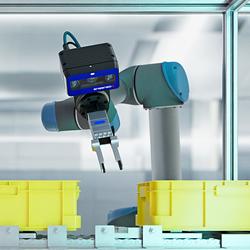New Study Reveals Self-Driving Cars Could Open 2 Million Employment Opportunities for People with Disabilities
Ruderman White Paper on Self-Driving Car Technologies: The Impact on People with Disabilities shows that mitigating transportation-related obstacles for individuals with disabilities would also save $19 billion in annual healthcare expenditures
Washington, D.C., January 17, 2017 - A white paper commissioned by the Ruderman Family Foundation and Securing Americas Future Energy (SAFE) has revealed that an astonishing two million employment opportunities could be opened and $19 billion in annual healthcare expenditures could be saved if people with disabilities had access to the basic transportation needs that could be provided by autonomous vehicles. The paper, titled The Ruderman White Paper on Self-Driving Car Technologies: The Impact on People with Disabilities, also encourages a greater dialogue surrounding the potential benefits that these emerging transportation technologies can offer to people with disabilities. Representatives of the Ruderman Family Foundation and SAFE will hold a press call today at 1:00 PM, please call (888) 567-1603 at that time to participate. Robbie Diamond, President and CEO of Securing America's Future Energy, Jay Ruderman, President and CEO of the Ruderman Family Foundation, and Henry Claypool, Policy Director at the Community Living Policy Center at the University of California, San Francisco will be available to respond to media questions.
"Autonomous vehicles can spark the greatest positive change in our society since the industrial revolution," said Robbie Diamond, President and CEO of Securing America's Future Energy. "In addition to the tremendous energy security benefits, its exciting that this technology will improve quality of life and boost employment access for millions of Americans with disabilities, from veterans to the elderly to people born with health challenges, which is why SAFE looks forward to continuing its work to ensure that AVs are deployed as soon and as safely as possible. My own daughter has mobility challenges and I can personally understand how self-driving will change her life for the better."
"Self-driving vehicles have the potential to significantly improve transportation, employment, access to healthcare, and simply general inclusion of people with disabilities," said Jay Ruderman, President of the Ruderman Family Foundation. "This is why, as developers move to create fully autonomous vehicles, it is imperative that the disability community be fully included and consulted in every step of developing and mainstreaming this new technology."
The report, co-authored by Henry Claypool, Policy Director at the Community Living Policy Center at the University of California, San Francisco, Amitai Bin-Nun, Director of the Autonomous Vehicle Initiative at SAFE and Jeff Gerlach, Senior Policy Analyst at SAFE, calls on an urgent need to develop a common agenda at the intersection between autonomous vehicles and disability policy, requiring broad political organization, and eventually action, in order to make progress and ensure the voices of individuals with disabilities is heard.
"With the release of this paper, it becomes clear that self-driving cars will make it possible for millions more Americans to have better access to healthcare, live more independently and achieve greater economic self-sufficiency," said Claypool.
The report's authors also noted a legal commitment to be upheld as autonomous vehicles are developed. The Americans with Disabilities Act (ADA) states that if a private company offers such transportation services, equal access to public accommodations must be made to provide the same services to people with disabilities as those without.
"Technology has finally made this dream of a fully inclusive transportation system possible and it is on us to do what we can to make this a reality and uphold the values of one of our most historic legislations, the Americans with Disabilities Act," continued Ruderman.
About the Ruderman Family Foundation
The Ruderman Family Foundation is an internationally recognized organization, which advocates for the full inclusion of people with disabilities in our society. The Foundation supports effective programs, innovative partnerships and a dynamic approach to philanthropy in advocating for and advancing the inclusion of people with disabilities throughout America.
The Ruderman Family Foundation believes that inclusion and understanding of all people is essential to a fair and flourishing community and imposes these values within its leadership and funding.
For more information, please visit www.rudermanfoundation.org
About Securing Americas Future Energy
Securing Americas Future Energy (SAFE) is an action-oriented, nonpartisan organization that aims to reduce Americas dependence on oil. Near-total dependence on petroleum in the transportation sector undermines the nations economic and national security, and constrains U.S. foreign policy. To combat these threats, SAFE advocates for expanded domestic production of U.S. oil and gas resources, continued improvements in vehicle fuel efficiency, and transportation sector innovations including electric vehicles, natural gas trucks, and autonomous vehicles. In 2006, SAFE joined with General P.X. Kelley (Ret.), 28th Commandant of the U.S. Marine Corps, and Frederick W. Smith, Chairman, President, and CEO of FedEx Corporation, to form the Energy Security Leadership Council (ESLC), a group of business and former military leaders committed to reducing the United States dependence on oil. Today, the ESLC is co-chaired by Frederick W. Smith and General James T. Conway (Ret), 34th Commandant of the U.S. Marine Corps.
Featured Product

